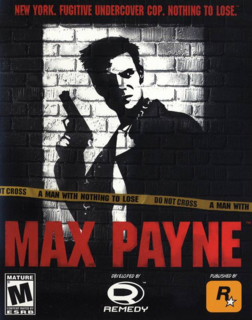Remedy's seminal shooter is a prime example of cohesive game design that stands up well over a decade later.
This decade has been mostly kind to Max Payne, but there are still several issues that remind you of the game's age. Some of these are more serious than other; the most egregious problem being that the game doesn't run properly on modern machines. The decade old technology of Max Payne doesn't fit perfectly with current computers, the result of this is that the sound is broken if you have Windows Vista or 7. Meaning no soundtrack and none of the games famous narration; you can still read the comic book cutscenes, but the lack of voice over takes away a lot of the appeal. Also a complete lack of in game narration means you are missing out on one of the games key features (and there are no in game subtitles either). The sound is not completely broken, every now and then (when you reload a save) it will return, but it doesn't last and only rarely makes a transition into the comic book cutscenes. Luckily however in engine cutscenes have audible dialogue, meaning you can still follow the story. Of course there is a fix for the sound issue; a quick Google search will find you numerous user made patches. This sorts out the game's main issue, but begs the question that if it's as simple as one patch, why hasn't the developer remedied this?
On its own terms, Max Payne's flaws are all relatively minor. The combat pacing suffers in some parts - and the old school game design can feel a bit unfair later in the game - but these are all very minor problems in an otherwise great game. One larger problem is that the game's ambition can sometimes stretch too far, several scripted set pieces are far too easily broken, and over reliant on trial and error. An escape through a burning restaurant is thrilling at first, but poor sign posting and only one correct route means that the thrill of this segment is quickly replaced by frustration. Other similarly ambitious segments are just as flawed; the game features a few dream sequences which have an interesting story impact, but are marred by poor gameplay. These segments are far from imaginative and just boil down to walking through a maze's long corridors and some very awkward platforming in a black room. It's admittedly a nice change of pace, but the uninspired gameplay makes these a real missed opportunity.
In spite of these issues though, Max Payne is still a great game. This is due to excellent core gameplay that makes the game a thrilling experience, even eleven years later. Max Payne may be just a shooter, but a few great decisions give it a very special feeling. The most obvious of these is the inclusion of bullet-time, a time slowing mechanic which enables protagonist Max Payne to dodge bullets and perform mid air dives in slow motion. It's great to look at, and it's a very effective way to take down multiple enemies before they can take you down. Importantly though, it works because the game is built around it. A classic non-regenerating health system means that every shot matters, and this bullet-time mechanic means that a skilled player can get through any fight without taking damage. This is important because the game isn't always great at providing you with health items and Max takes a lot of damage; this may sound like a negative but it enforces the need to play tactically and use bullet-time effectively. A shot to the head or a blast from a shotgun may finish Max off, but clever use of slow motion makes certain death always avoidable, and the ability to quick save at any time adds an addictive element to acing every gun battle. One slight negative is that Max's time defying abilities don't control perfectly, but they control well enough for what the game requires of them
By far the most impressive feature of Max Payne is how well it holds up, the melodramatic Noir story may not be very original, but it is well written and exceptionally well told. Max Payne is a great example of cohesive game design, numerous gameplay and story elements interweave and work together to make a complete experience that is copied by many but matched by few. Even eleven years later, Max Payne is still worthy of your time and money.

